I recently got a road named after me. It is a new road, big and sturdy for its length and purpose, and it cuts right through a forest. There is a story around this forest and this road, I won’t outline the details here, though they are fascinating. The reason it has my name is interesting on a more fundamental level. The proximate reason is that the forest was planned for cutting and I pledged for its life. It is a small forest; we are in the archipelago of Stockholm and most forests don’t stretch very far. It has been in the same family for many generations and has never been cut down, just a few trees have been taken for timber or firewood. In the higher parts it is almost bare rock with pine trees and lichen, spruce forest or bogs in the lower parts. I have wandered through this forest my whole life. On foot, with a dog or on a horse. It is a familiar place, and it just changed owner.
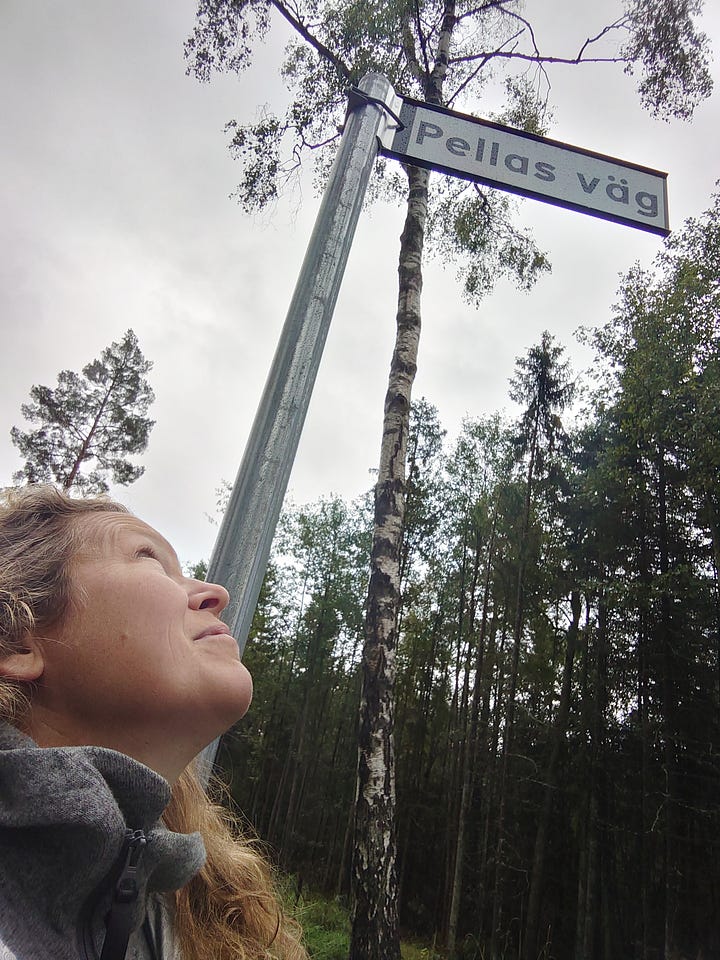
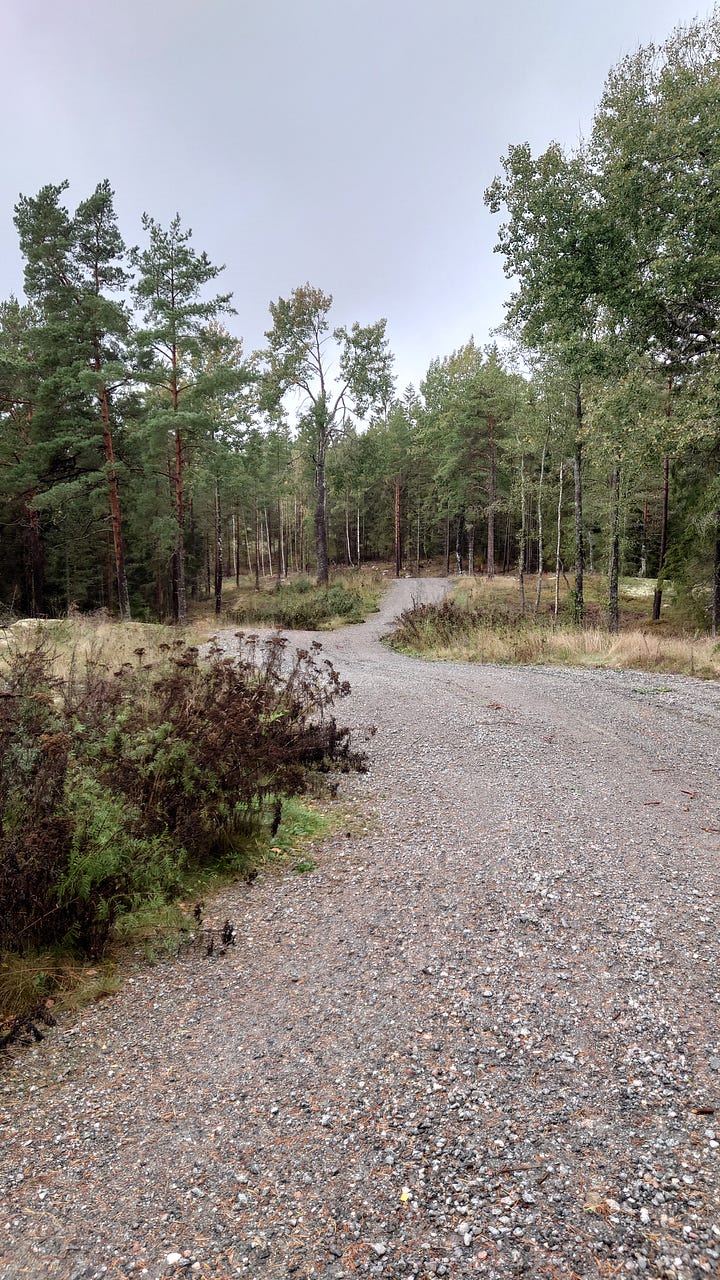
When it was unexpectedly marked with tape, outlining the roads for machines and the borders of the felling, I had to act, even if it felt uncomfortable to interfere in a neighbours’ land management. Some friends who are more species literate than I am came to help. They found several red-listed species, some of them I have seen in big forests in the north, but I never dreamed they could live here in my backyard (e g the beautiful Fomitopsis rosea, rosenticka, below). I used a tree drill to measure the age of one of the pines. Swiftly choosing one of the trees that looked reasonably old, I thought it would be more than 200 years (which is not really old age for a pine, but old for a tree nowadays since most are cut down as soon as they grow big). Later in the evening, counting the growth rings, I was astonished. I am also getting older and my eyesight is not as good as it used to; I decided to wait until daylight next day. First thing in the morning, I made the count anew. 444 growth rings. Even for a pine, that is an old tree. I didn´t get to the core of it, so I believe it was already growing there as legendary King Gustav Vasa, who died 1560, ruled the country. It is a dizzying time perspective.
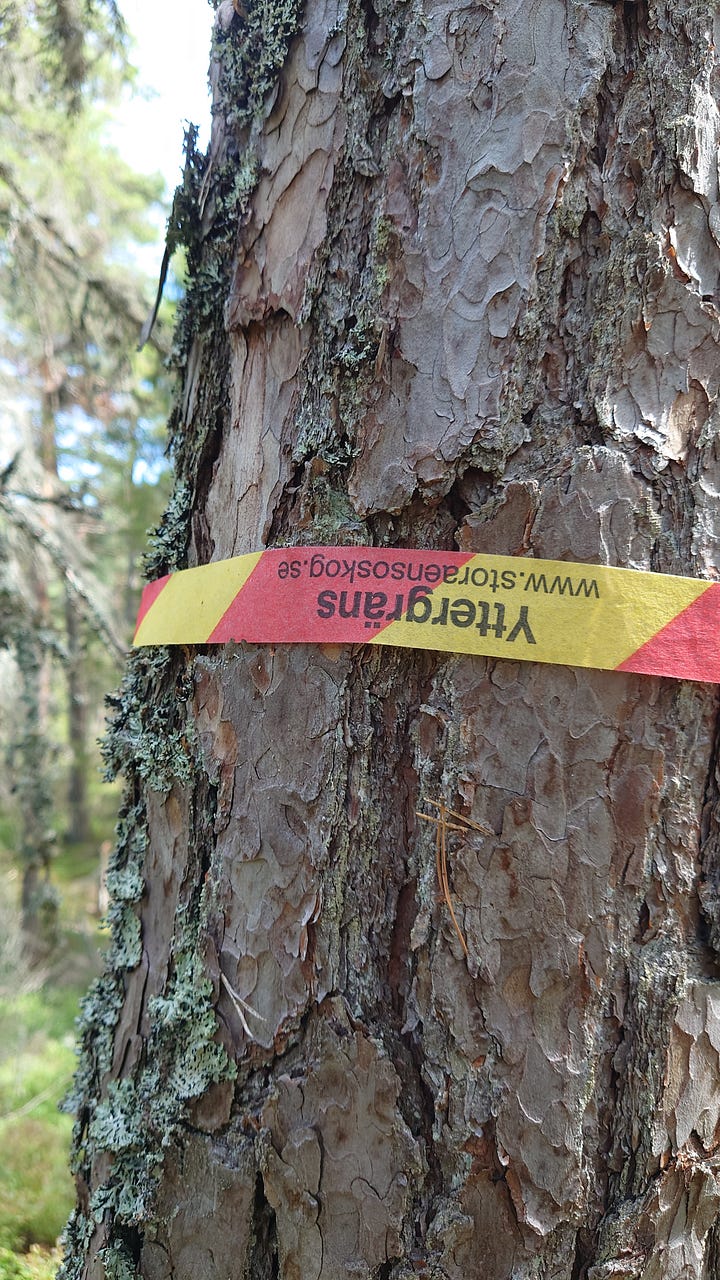
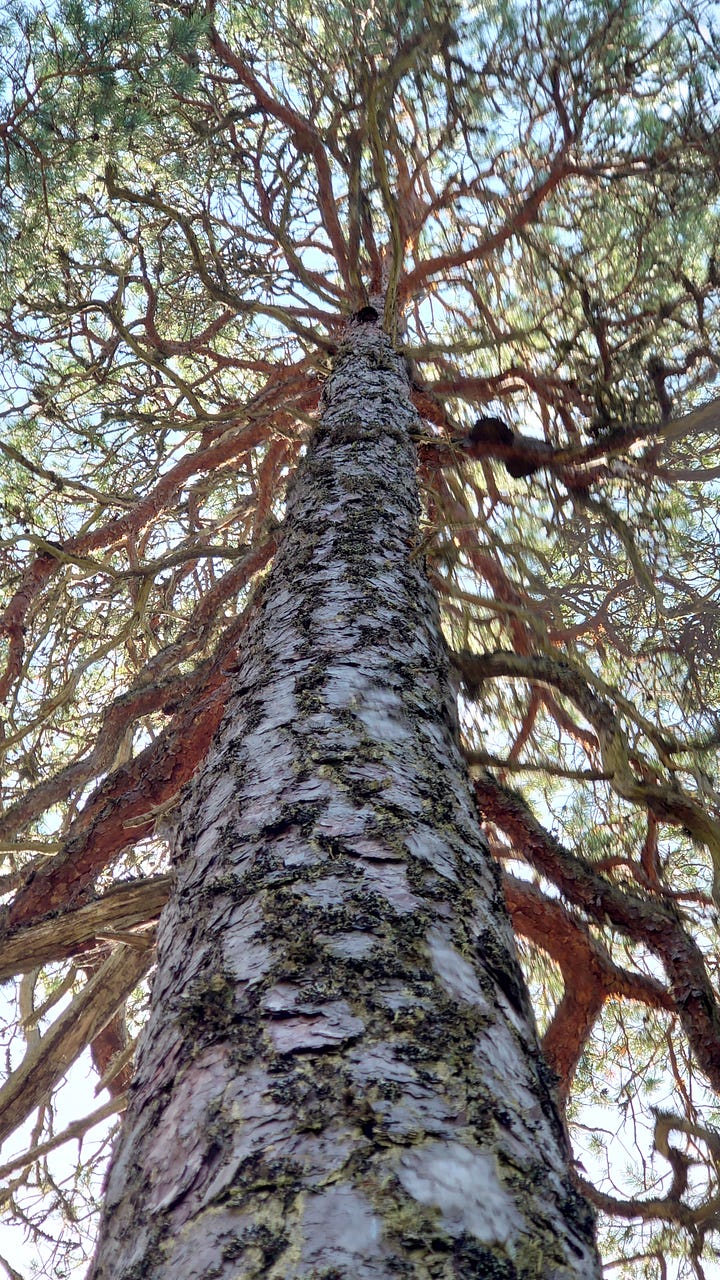
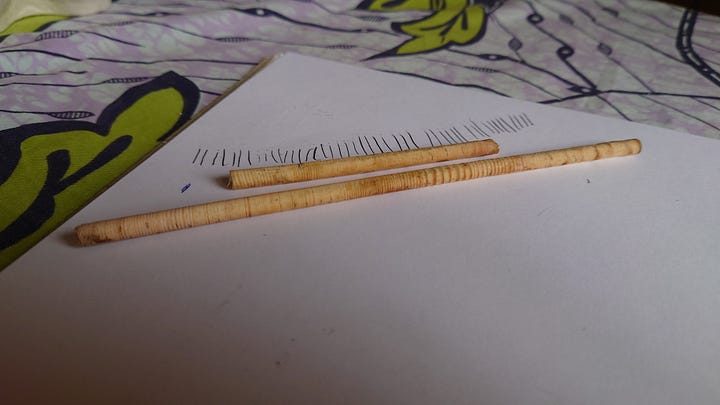
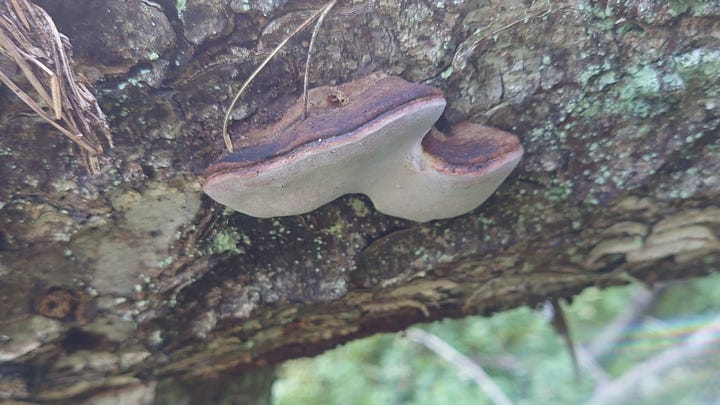
Anyway, in this day and time such trees and such patches of forest are soon no longer to be seen, and the delivery time is obviously several centuries. No matter how rich you are, you cannot order them. Why would anyone want to cut it down? I took a walk with the new owner of this land and asked. He has a long experience with forestry. “I have learnt that this is what you do with forest: you cut down trees and plant new ones”, he said. As he agreed to keep the forest alive, he said that the road, made to take out the timber, will be the most expensive road never used for its’ purpose and asked if it could have my name.
The forest on the other side of the farm where I live also has a new owner. He asked me what to do with it: “I get all kinds of messages from business, forest companies, entrepreneurs and from the forest authorities, but they say the same thing: the forest needs to be cut. Do I have to do that?”
Our society teaches this: the value of a forest it what you get out of liquidating it. Society, with its logic and institutions, encourages us to view the forest as nothing but a bunch of trees which can be converted to stuff to sell. Something we can own and decide the fate of. I think it is very offensive that forest authorities, responsible for keeping the forests in healthy condition with intact biodiversity – a goal they are flagrantly missing, decade after decade – would encourage anyone to fell their forest. They should do the opposite. But the interesting aspect of this story is another. It has to do with how difficult it seems to be to hold values that are counter to those promoted by society.
Speaking of Gustav Vasa, the King felt threatened by how the Church of Sweden had become a powerful landowner through centuries of donations and withdrew most of the land in the 16th century reformation. Still, the Church of Sweden is one of the largest forest owners in the country (owns around 1,7 % of the forest). For several years it has been heavily criticized for its brutal forestry. Rightly so, as an organization responsible towards nothing less than the Creator himself… Last week, the Church released a report from a 16 month investigation of how its forestry could become more sustainable. The report (summary in english) proposes a transition to a forestry ”closer to nature” which prioritises spiritual, ecological and social values, contrary to the main focus on economic values which has been the case so far. Two former archbishops, Antje Jackelén and Anders Wejryd, made a theological interpretation of what spiritual sustainability may mean for the management of the Churchs’ forests. Jackelén commented the report by making a comparison with how the Church disinvested from fossil fuels, a decision which was accompanied by worry of economic losses, but turned out to be satisfying in terms of profit. “Now it takes similar courage to lead the way and show that there are climate smart solutions without financial loss”, she added.
That an ex-archbishop feels a need to motivate a move in a life-affirming direction with maintained profit levels is a sign of our disability to understand and express what is valuable. If such a person does not voice an opinion that we should treat the forest/the creation respectfully because it is the right thing to do, because we care - then who will? It shows that there are no reference points for understanding that we can do things simply because it is important for more-than-human beings. Our culture has no framework for valuing life in itself. This is such an astonishing and deeply explanatory unveiling of spiritually poverty. If we cannot hold and share the understanding that a tree, a forest, life is valuable for its own sake, then no wonder we are liquidating the natural world?
And it is a continuous revelation, as people tend to attach those values to me. To use my values as an explanation or excuse for their actions when they go in a caring direction. Like they do it for my sake or for my approval. This is very intriguing. As if they cannot explain those choices with their own values, so they use mine. Why is that?
I think it may be because to care, you have to really show up as a human being. When what you care about is daily threatened with destruction, there is also loss, sorrow and rage involved. To express your care for something that runs counter to what society tells you is progress or development, you have no one to trust but your own values. You have to act as a sovereign. I cringe a bit to write this with myself as an example. There is really nothing special about me, other than this: I care. I do value this beautiful, living world highly, and I do feel strongly about the destruction of it. In the words of one of my teachers, Stephan Harding at Schumacher College who sadly passed away a few weeks ago, I am probably Gaia’ed. In other words, I have fallen in love with the Earth, with Gaia. I have the experience of living inside a living planet, not on it (beautiful explanation here: Learning to value). I can´t remember a point in life at which this happened; it is more like an ongoing process, a practice where I go deeper into that belonging.
If pleasing me makes people feel that their actions are reasonable, I guess that is alright. I´ll carry that, roads and all, for now. But I also strive for you to find your own values and responsibility. Your own irresistible attachment. Your voice for what you care deeply about. For you to lean into the understanding that when you are a part of something so vast as the living world, your self is so much bigger than your own little sphere of consciousness. That what you care for, is what cares for you, from your first breath to your last.
Then we may shift our human being with Gaia - from the rational Homo sapiens, to the loving Homo caritas, perhaps.
A beautiful interview with Stephan Harding
PS: we held a follow up seminar around this particular forest, with my friend the forester who has practised close-to-nature forestry for 30 years. He showed how he has higher returns over both short- and longterm than “conventional” forestry.
It just feels less important :)




"Our society teaches this: the value of a forest it what you get out of liquidating it. Society, with its logic and institutions, encourages us to view the forest as nothing but a bunch of trees which can be converted to stuff to sell. Something we can own and decide the fate of. "
And this is the model that now applies to all of us. We have become units of production, just like the forest, the animals, the fish, birds, and all of Life. If our addiction to money doesn't stop we are going to create a lot more extinction. But the biggest of all, for us, will be the human species, itself. Nature, can and will replace what we have destroyed, once we stop following the gods of destruction.
It's a great article. Thank you Pella.
Thank you for sharing this journey. It made me teary-eyed to know that the forests around your area are safer because of you and your ability to connect with the other people involved in their care. And it didn't take tying your body to a tree or laying down in front of a bulldozer. One can hope that your neighbors, in their forestry roles, will also take that message down the line in the industry. One can hope. Sending you a great big hug Cousin! And I love that you have a road!! It is just more evidence of your amazing impact on the world.